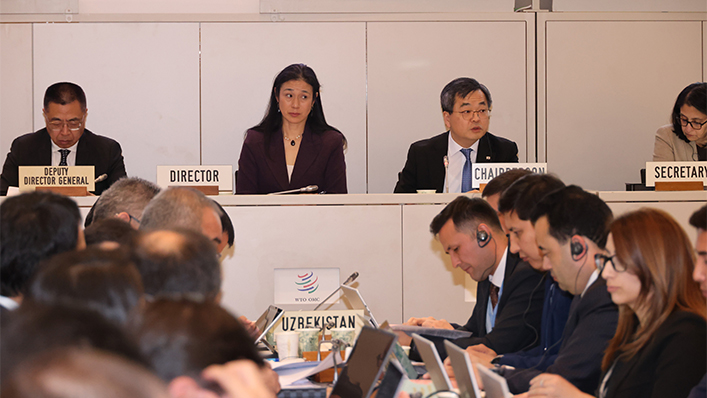
The high-level Uzbek delegation in Geneva included the Special Representative of the Uzbek President on WTO issues and Chief Negotiator for WTO accession, Azizbek Urunov, and other senior government officials, including Deputy Minister of Economy and Finance, Ahadbek Khaydarov. High-level officials from a wide range of ministries and agencies joined virtually from Tashkent.
In his opening remarks, Deputy Prime Minister Khodjaev noted that for Uzbekistan the WTO accession process is not merely a technical exercise but a powerful catalyst for the broader domestic reforms underway. He also reaffirmed the ambitious target set at the 8th Working Party meeting in May 2024 to complete Uzbekistan’s WTO accession by 2026.
“This goal was not only a statement to our international partners but also a clear message to all stakeholders and the business community in Uzbekistan. It signalled the inevitability of our country’s accession to the WTO and provided domestic stakeholders with the necessary time to adapt to the ongoing reforms and prepare for the new challenges that will accompany integration into the global trading system,” he said.
Looking ahead, he said Uzbekistan is determined to continue its ambitious reform agenda while maintaining a steady course toward WTO accession. In the coming year, Uzbekistan will further intensify efforts to finalize outstanding negotiations and harmonize its legal and regulatory frameworks with WTO agreements. “We aim to ensure that by 2026 Uzbekistan not only becomes a full-fledged member of the WTO but also a model of successful integration into the multilateral trading system, fostering economic resilience and inclusivity,” he added.
Chief Negotiator Urunov highlighted the significant progress in bilateral negotiations. Since the 8th Working Party meeting, Uzbekistan has successfully concluded negotiations with nine additional members, bringing the total number of concluded bilateral negotiations to 22. “This is the testament to the dedication and hard work of all parties involved. We are confident that these agreements will lay a solid foundation for Uzbekistan’s successful completion of the WTO accession process,” he said.
WTO Deputy Director-General Xiangchen Zhang welcomed the positive developments since the last meeting, especially the continued reform efforts undertaken by Uzbekistan. He highlighted Presidential Decree DP-85 of June this year, which brings certain Uzbekistan laws and measures into conformity with WTO law, in direct response to concerns raised by members.
“The Decree itself was a catalyst for faster reform and I am pleased to see that its implementation is being followed through. I trust that these efforts very much reflect President (Shavkat) Mirziyoyev’s vision that the reforms that have been started now need to be accelerated in order to meet the goal of acceding to the WTO. Director-General Ngozi Okonjo-Iweala, who visited Tashkent in early June, continues to take a keen interest in this accession,” said DDG Zhang.
The Chair of the Working Party, Ambassador Yun Seong-deok of the Republic of Korea, stressed the “faster, continuous and technically focused” work being done between Working Party meetings. He noted that this momentum is being built on the solid progress registered both on the bilateral and multilateral tracks. In addition to the technical work, he emphasized the direct involvement of President Mirziyoyev in building momentum in the accession process.
The Chair also underscored the collaboration between the three Bretton Woods institutions in supporting Uzbekistan’s accession-related reforms. The International Monetary Fund (IMF), the World Bank and the WTO co-organized a high-level event in Tashkent in June and more recently in Washington during the IMF-World Bank Annual Meetings with the participation of WTO Deputy Director-General Johanna Hill.
The Working Party completed the first review of the Draft Report of the Working Party (the formal document which spells out the agreed specific commitments that the acceding government would undertake as a WTO member). Members also reviewed the legislative developments on the basis of the Legislative Action Plan. Following the 8th Working Party meeting in May, Uzbekistan has adopted a number of legal acts to bring its trade regime in compliance with WTO rules. Uzbekistan also circulated 21 pieces of draft and adopted legislation for members’ review, bringing the total pieces of legislation submitted to 192 since 2020.
Ambassador Yun thanked members and Uzbekistan for their constructive engagement, which has allowed the Working Party to make further progress, especially in understanding what actions are required from Uzbekistan in the coming months as the accession process enters a critical period.
Moving forward, the Chair encouraged Uzbekistan and members to step up their substantive engagement in 2025 to advance work towards finalization. He expressed the hope that the next Working Party meeting could be convened in the spring of next year. Members acknowledged Uzbekistan’s efforts and urged the Uzbek delegation to continue its work to achieve significant progress ahead of the 10th Working Party meeting.
“I believe that further progress to be made in the next seven to eight months will decide the prospect of meeting the goal of finalizing this accession in 2026 set by Uzbekistan, which seems to enjoy support from a large part of the WTO membership,” said Ambassador Yun.
Share
Reach us to explore global export and import deals